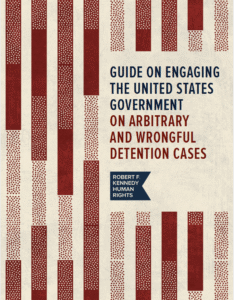On December 14, the Inter American Commission on Human Rights (IACHR) will hold a public (virtual) hearing on the case of Oswaldo Payá Sardinas, Harold Cepero et al vs Cuba. The case was filed by Robert F. Kennedy Human Rights in 2013. During the hearing, the IACHR will hear the testimonies of family members, and legal arguments on the merits of the case from our team. Here’s what you need to know about the case and the upcoming public hearing:
Oswaldo Payá was a prominent human rights defender who promoted democracy and human rights in Cuba. Mr. Payá created the Varela Project to fight for Cubans’ rights to freedom of expression, freedom of the press, and freedom of association, among other fundamental rights.
Oswaldo Payá was a founding member of the Christian Liberation Movement (MCL for its Spanish acronym), an organization dedicated to human rights and democracy in Cuba. As a way to solidify the efforts of the MCL, Mr. Payá and others created the Varela Project, an initiative that focused on converting the ideals of freedom of expression, association, and press into concrete law. The Varela Project also strove to materialize the right to free elections in Cuba, and the release of political prisoners. Mr. Payá and his associates were well known for their activism throughout Cuba for many years.
The deaths of Oswaldo Payá and fellow activist Harold Cepero display the systematic patterns of persecution of political opposition leaders, and activists for human rights and democracy in Cuba.
In July of 2012, Mr. Payá, and fellow MCL member Harold Cepero were killed after the car they were travelling in with two other activists was intentionally charged by another vehicle bearing government license plates. The official report from the Cuban authorities stated that Ángel Carromero, the driver that day, lost control of the car, and he was subsequently convicted in Cuba, after a sham investigation, for vehicular homicide. Following his release to his home country of Spain, Carromero told the press that a hit from behind caused the crash and that Cuban authorities forced him to make a false confession. The Payá family provided evidence during the domestic investigation and judicial proceedings that fully countered the official version of events. Nonetheless, the Cuban authorities ignored the family’s complaints and refused to give them access to the investigation, and to guarantee their participation in the process.
The family of Oswaldo Payá continues to advance his legacy, fighting for justice, democracy and human rights. After Oswaldo Payá’s murder they were forced into exile due to continuous persecution by Cuban autorities.
In the months following Mr. Payá’s death, his daughter Rosa Maria Payá Acevedo began campaigning for an independent investigation into the death of her father, and for governments around the world to hold Cuba accountable to international human rights standards. In the months and years following Payá’s death, his family received threats, were under a constant state of surveillance, and were routinely stalked by state security forces. The persecution that followed Payá’s death, forced them into exile. Despite all this, the family has maintained close involvement in the case before the IACHR, and has continued to advance Mr. Payá’s legacy, inspiring many in the fight for freedom .
What happened during the IACHR hearing and what to expect now.
The public (virtual) hearing took place on December 14. The hearing allowed the IACHR to hear firsthand accounts from members of the Payá family, and to hear the legal arguments on the merits of the case from the legal team at Robert F. Kennedy Human Rights, who are representing the victims in this case. This hearing also bolsters the prolonged efforts of the Payá and Cepero families in their pursuit for justice and truth.
The IACHR will not be issuing a decision immediately, but we are hoping that this hearing will help the Commission to issue a favorable decision soon, holding the State of Cuba responsible for the murders of Mr. Payá and Mr. Cepero, and for the denial of the right to justice and the right to truth for their families.
The case of Oswaldo Payá is also relevant in light of the current situation in Cuba, particularly how the regime continues to repress and persecute political opponents and critical voices that demand a return to democracy and the respect for human rights.
This case remains very relevant as Cubans continue to fight for human rights and democracy. In July 2021, Cuba experienced the largest anti-government demonstrations it has seen in many decades. Thousands protested against the regime, for its failure to provide food and healthcare in the midst of a pandemic, and for its critical restrictions against political liberties, including freedom of expression. The protesters took to the streets demanding liberty and democracy, and expressing that political power should be restored to the Cuban people. Many protesters were arbitrarily detained, and others were injured by State forces.
In response to the protests, the Cuban regime reacted violently toward protesters, and blamed outside forces for the dissension. This is a continuation of the regime’s pattern of persecuting and attempting to silence human rights defenders and others who oppose them. If the IACHR holds Cuba accountable for the deaths of Oswaldo Payá and Harold Cepero, it will send a clear message that the State of Cuba cannot continue to violate the human rights of its citizens with impunity.
If you want to learn more about RFK Human Rights’ involvement in the case, please click here.
If you want to register for the hearing (in Spanish), please click here.




